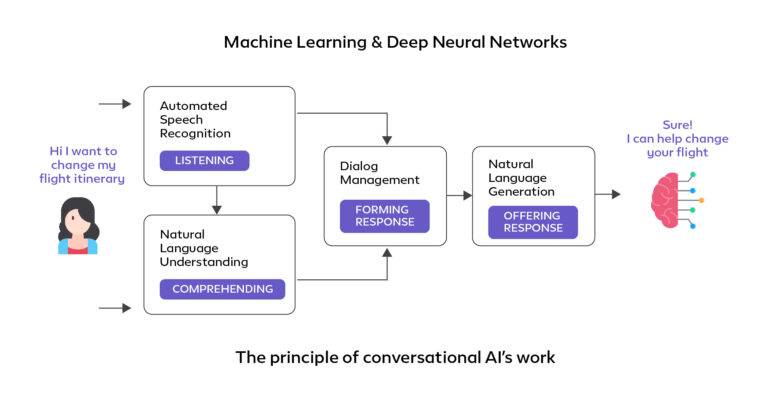- August 9, 2023
- Posted by: Kavitha V Amara
- Category: Data & Analytics

In the vast realm of technology, certain concepts and innovations often go unnoticed, overshadowed by the glitz and glamour of Hollywood’s most iconic characters. Just as some actors hide in plain sight, the true potential of Conversational AI in the realm of e-commerce remains relatively unrecognized. However, beneath the surface, this hidden gem holds immense value and transformative capabilities for businesses willing to explore its possibilities.
Conversational AI refers to the application of systems that enable users to communicate with and receive responses from AI assistants and chatbots. It enables businesses to give clients a satisfying buying experience.

The Global Market Landscape of Conversational AI

The global market for Conversational AI is experiencing a significant surge, with organizations recognizing the immense potential it holds for enhancing customer experiences, improving engagement, and driving sales. From chatbots and virtual assistants to voice-activated interfaces, Conversational AI solutions are becoming increasingly sophisticated and capable of delivering personalized interactions in real-time. This technology is reshaping the way businesses interact with customers, enabling seamless communication, and fostering brand loyalty.
Marketers as Torchbearers
As marketers wield the power to shape trends and drive adoption, they play a crucial role in bringing Conversational AI to the forefront of e-commerce. By effectively communicating the benefits and value of Conversational AI solutions to companies, marketers can inspire organizations to embrace this powerful tool. They can highlight how Conversational AI can enhance customer satisfaction, streamline support services, and provide valuable insights for better decision-making, ultimately driving business growth and competitiveness.
Defenders Being Assaulted: Navigating the Challenges
Despite its potential, Conversational AI in e-commerce faces its share of challenges. It encounters doubters who question its effectiveness, cybersecurity threats that demand robust defence mechanisms, and the need to combat data bias to ensure fair and inclusive interactions.
However, by adopting a proactive approach and continually refining the technology, defenders of Conversational AI can overcome these hurdles and release its true potential.
Observational Operation: Exploring Success Stories
In various industries, businesses have already embarked on reconnaissance operations, employing the power of Conversational AI to drive success. E-commerce giants are utilizing chatbots to provide personalized recommendations and streamline the customer journey.
Virtual assistants are transforming the way users interact with mobile apps, making transactions more intuitive and efficient. By examining these success stories and their strategies, organizations can gain insights into the possibilities and practical applications of Conversational AI.
Targeting New Territories: Expanding Beyond Borders
Conversational AI is not limited by geographical boundaries. As it gains traction globally, companies from different countries are embracing this technology to enhance their e-commerce operations. From North America and Europe to Asia and beyond, businesses worldwide are recognizing the potential of Conversational AI in delivering exceptional customer experiences and gaining a competitive edge in their respective markets.
For instance, a global fashion retailer could implement Conversational AI to provide localized product recommendations, answer customer inquiries in their preferred language, and offer tailored shopping experiences.
Prominent Players in Conversational AI Market
- Amazon Web Services, Inc.
- Microsoft Corporation
- Artificial Solutions Holding ASH AB
- SAP ERP
- Conversica Inc.
- Haptik
- IBM Corporation
- Google LLC
- Oracle Corporation
- Baidu, Inc.
North America to account for the largest market size during the forecast period.
North America is anticipated to dominate the Conversational AI market and hold the largest market share during the forecast period. This can be attributed to several factors, including the presence of key players in the region, substantial investments in advanced technologies, and a matured ecosystem for artificial intelligence and natural language processing. Additionally, the region has witnessed a significant adoption of Conversational AI across various industries, including e-commerce, healthcare, banking, and customer service.
Several prominent companies in North America have embraced Conversational AI to enhance their customer interactions and drive business growth.
For instance, Amazon has integrated Conversational AI into its virtual assistant, Alexa, allowing users to interact with smart devices using natural language.
Additionally, companies like Google and Microsoft have developed chatbot platforms that leverage Conversational AI to enable seamless communication between businesses and their customers. These real-world examples highlight the widespread adoption of Conversational AI solutions in North America, further solidifying the region’s position as the market leader in this technology.
 Fair Play: Nurturing Ethical AI Practices
Fair Play: Nurturing Ethical AI Practices
As Conversational AI becomes more pervasive, ensuring fair play and ethical practices becomes paramount. Companies must strive to minimize data bias, treat all users equitably, and prioritize privacy and security. By embracing responsible AI practices, organizations can build trust with their customers and create an inclusive environment that benefits all stakeholders.
Data Bias
Data bias can inadvertently seep into Conversational AI systems, reflecting and perpetuating existing biases present in the data used for training. To address this, e-commerce businesses must be vigilant in their data collection and ensure diverse and representative data sets are used to train Conversational AI models. Additionally, ongoing monitoring and evaluation of the system’s performance can help identify and rectify any potential biases. By actively combating data bias, e-commerce businesses can leverage Conversational AI to deliver equitable and inclusive experiences for all customers.
The magic of AI-powered recommendations
AI-based recommendation systems in e-commerce use algorithms to process customer data and provide personalized suggestions based on past purchases, browsing behavior, and search queries. The system continuously learns and improves, tailoring recommendations to individual preferences. By analyzing various data sources, such as user data (purchase history, click behavior, etc.), item data (descriptions, reviews, etc.), and social media data (from platforms like Facebook, Twitter, and Instagram), the system identifies patterns and trends to generate relevant recommendations. This helps customers discover new products and saves time by offering items they are more likely to purchase.
- Algorithms process customer data for personalized suggestions,
- Continuous learning and improvement of the recommendation system,
- Tailored recommendations based on individual preferences.
- Analysis of user data, item data, and social media data.
- Identifying patterns and trends for relevant recommendations
- Assisting customers in discovering new products and saving time,
Less Noise or More? Striking the Balance
As Conversational AI becomes increasingly prevalent, questions arise about striking the right balance between automated interactions and human touch. While automation enhances efficiency and scalability, it is essential to maintain a personalized and empathetic customer experience. Striking this delicate balance is key to reaping the full benefits of Conversational AI while preserving the human connection that customers crave.
In conclusion, Conversational AI in e-commerce is a hidden gem waiting to be discovered. With its potential to revolutionize customer interactions, boost engagement, and drive sales, this technology deserves greater recognition and adoption. By understanding the market landscape, navigating challenges, and nurturing ethical practices, businesses can unlock the true value of Conversational AI and pave the way.
To Speak to our analyst for a discussion on the above findings
Frequently Asked Questions (FAQ)
What is Conversational AI?
Conversational AI refers to the technology that enables machines to engage in natural language conversations with humans. It combines various fields such as artificial intelligence, machine learning, and natural language processing to understand and respond to human queries and provide meaningful interactions.
How is Conversational AI used in e-commerce?
Conversational AI has numerous applications in e-commerce. It can be used to develop chatbots and virtual assistants that assist customers in product searches, offer personalized recommendations, provide support, and facilitate seamless transactions. Conversational AI can also be integrated into voice-enabled devices, enabling customers to make purchases using voice commands.
What are the benefits of implementing Conversational AI in e-commerce?
Implementing Conversational AI in e-commerce brings several benefits. It enhances customer engagement by providing personalized and interactive experiences. Conversational AI can streamline customer support processes by handling common inquiries and issues, freeing up human agents for more complex tasks. It also helps in reducing response times, improving customer satisfaction, and boosting sales through targeted product recommendations.
Which are key verticals adopting Conversational AI solutions and services?
The key verticals adopting Conversational AI solutions and services include BFSI, healthcare & life Sciences, retail and eCommerce, telecom, travel and hospitality, automotive & transportation, media and entertainment.
Is Conversational AI only limited to text-based interactions?
No, Conversational AI extends beyond text-based interactions. It includes voice-based interactions as well, enabling users to communicate with virtual assistants and chatbots through voice commands. Voice-enabled devices like smart speakers and mobile assistants leverage Conversational AI to facilitate voice-based interactions and provide a more intuitive and hands-free user experience.
How secure is Conversational AI in terms of protecting customer data?
Conversational AI platforms prioritize data security and privacy. They employ various measures like encryption, secure data storage, and compliance with data protection regulations to safeguard customer information. Additionally, reputable Conversational AI providers implement stringent security protocols and regularly update their systems to mitigate potential vulnerabilities and ensure the confidentiality of customer data.
